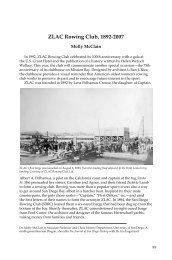Helen D. Marston Beardsley and Progressive Activism - San Diego ...
Helen D. Marston Beardsley and Progressive Activism - San Diego ...
Helen D. Marston Beardsley and Progressive Activism - San Diego ...
Create successful ePaper yourself
Turn your PDF publications into a flip-book with our unique Google optimized e-Paper software.
H ELEN D. MARSTON B EARDSLEY<br />
Mexican girls worked harder than their brothers. Yet she also began to underst<strong>and</strong> that<br />
her earlier perceptions of an innate laziness among Mexican males had little to do with<br />
initiative <strong>and</strong> everything to do with opportunity. She struggled with this realization,<br />
claiming, “the imputation of laziness to men <strong>and</strong> boys has more foundation,” but also<br />
admitting that, “the issue is a harder one to decide.” 67<br />
Such a change in perspective did not come immediately, even to someone as<br />
devoted to social justice as <strong>Helen</strong> <strong>Marston</strong>. In the 1920 Survey article, <strong>Marston</strong><br />
revealed her ethnocentric self by explaining that Mexican fathers needed more<br />
ambition to adequately support their families. She admitted, however, not knowing the<br />
Mexican father well, thereby opening the door to underst<strong>and</strong>ing how race, gender <strong>and</strong><br />
ethnicity defined opportunity. <strong>Marston</strong> recognized the “distinct effort” made by some<br />
Mexican fathers to attend English classes offered at Neighborhood House but also<br />
admonished those fathers not in attendance for not trying hard enough to learn<br />
technical skills <strong>and</strong> English. She understood that the problem for Mexican fathers <strong>and</strong><br />
their sons lay in their “lack of ideas rather than an unwillingness to work,” yet she<br />
struggled with these realizations. 68<br />
<strong>Marston</strong> was not alone in her revelations. Edith Shatto King preceded <strong>Marston</strong> in<br />
using the Survey to emphasize how her <strong>San</strong> <strong>Diego</strong> childhood had prejudiced her<br />
outlook of non-white families. Recalling that her father blamed Mexicans if anything<br />
was missing about the garden, King admitted to the Survey audience in 1917, “as a<br />
child, I was never taught to fear or hate the ‘dirty’ Mexicans, only to despise them.”<br />
Mexican <strong>and</strong> Anglo children did not play together <strong>and</strong> it was that segregation that<br />
eventually shook King’s thoughts on Mexicans. She recounted an incident from<br />
childhood in which a group of Mexican children had grown angry at not being able to<br />
play in the favorite spot of Anglo children. Their anger confused her as a child but set<br />
King on a path that eventually led her to work toward social justice through settlement<br />
work. The memory of Mexican children unjustly persecuted served as the foundation<br />
for King’s implementing English classes at Neighborhood House so that the children<br />
could perform better in the public schools. She also organized dances <strong>and</strong> playgroups<br />
so that Mexican youngsters had their own safe places to play. 69<br />
King’s actions had little to do with Americanizing or control as some scholars of<br />
settlement workers have charged. Rather, she wanted to remedy some of the hurt her<br />
family <strong>and</strong> friends had inflicted on their Mexican neighbors in the past. Yet she, as well<br />
as <strong>Marston</strong>, fell to using stereotyped descriptions of families as a way to highlight<br />
likeable characteristics: festive costumes rather than threadbare rags, wafts of perfectly<br />
spiced foods rather than the meager rations put before children, <strong>and</strong> families gathered<br />
in gay circles of music rather than parents dead tired from long hours of physical labor.<br />
<strong>Marston</strong> <strong>and</strong> King used the notions of a primitive culture to shine a positive light on<br />
their Mexican clients. King romanticized the poverty of Mexican migrants, offering her<br />
readers a sanitized vision of crude conditions:<br />
They lived, for the most part, in shacks decorated with long strings of red<br />
peppers drying in the sun…On moonlight nights one rarely passed by<br />
without hearing the soft tones of La Paloma from a guitar or a violin, <strong>and</strong><br />
sometimes laughter <strong>and</strong> gay Spanish words, coming from the shadows under<br />
the pepper trees. Other families of Mexicans liked the open starlight better<br />
than shack or garden. They traveled in groups <strong>and</strong> camped about the country<br />
wherever work was to be found . . . Men, women <strong>and</strong> children worked<br />
together. And how vivid in my memory are the women at work in the peanut<br />
113


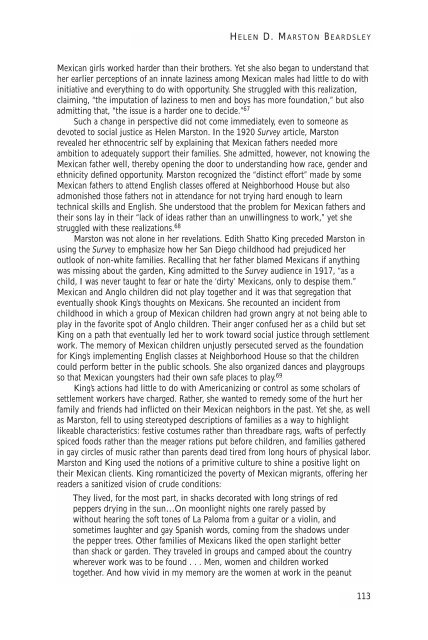


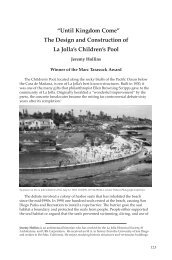
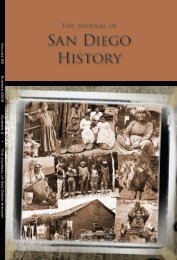
![[PDF] The Journal of San Diego History Vol 52: Nos 1 & 2](https://img.yumpu.com/25984149/1/172x260/pdf-the-journal-of-san-diego-history-vol-52-nos-1-2.jpg?quality=85)
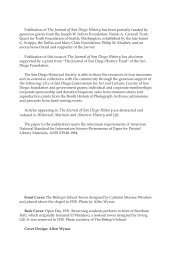
![[PDF] The Journal of San Diego History - San Diego History Center](https://img.yumpu.com/25984131/1/172x260/pdf-the-journal-of-san-diego-history-san-diego-history-center.jpg?quality=85)




